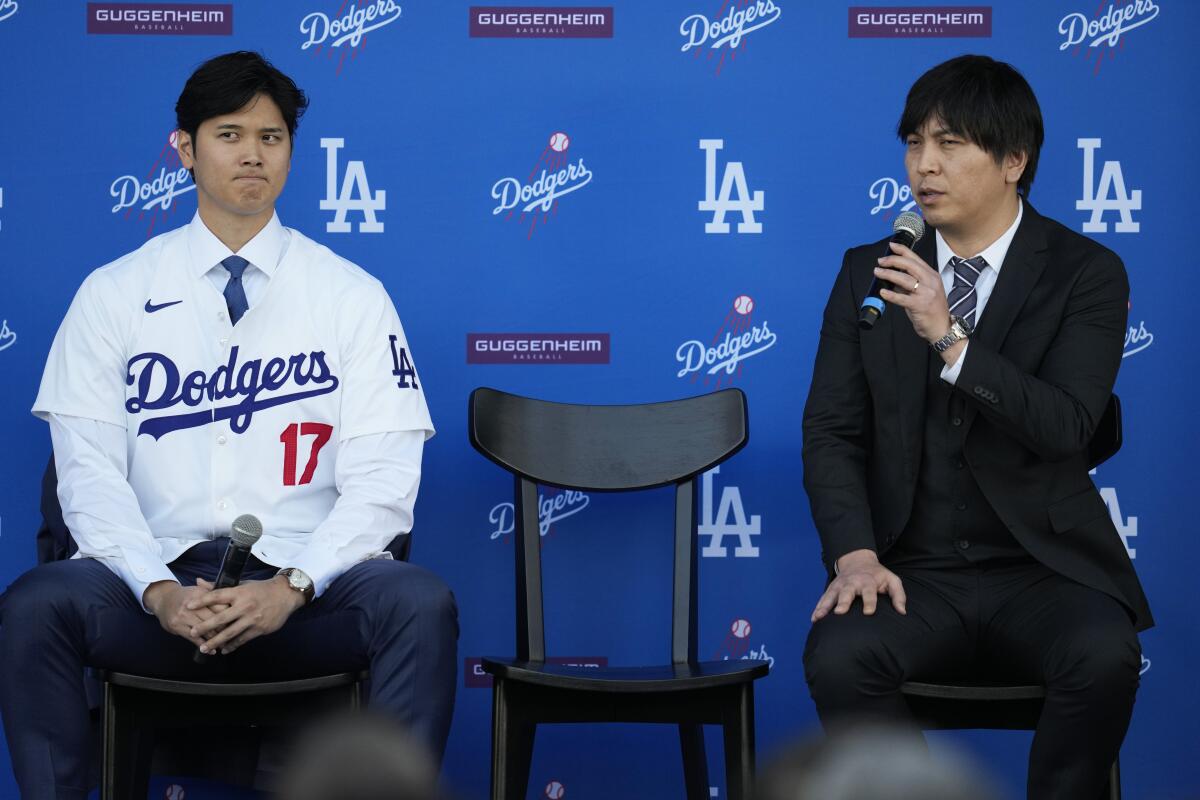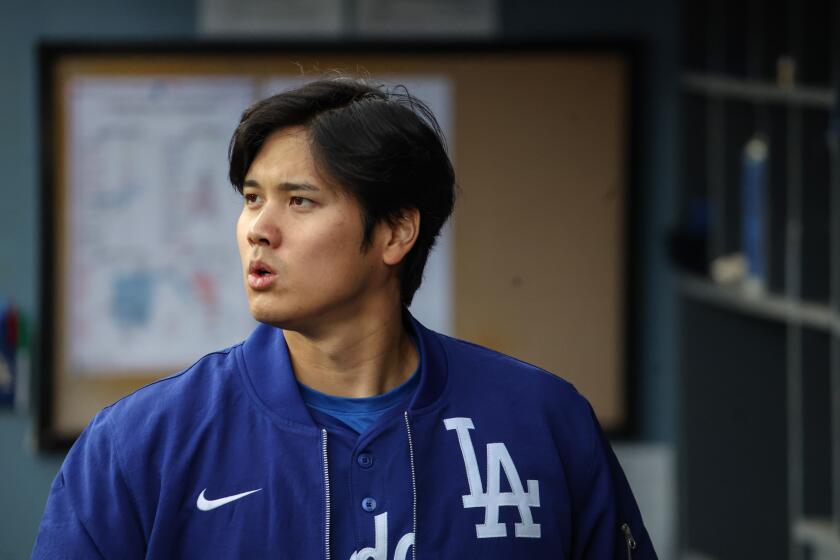The mysterious life — and questionable claims — of Shohei Ohtani’s interpreter

- Share via
They were one of the best-known duos in baseball. Wherever star pitcher and slugger Shohei Ohtani went — to practice, to the gym, to Japanese restaurants in Orange County — his interpreter Ippei Mizuhara was never far behind.
His Beatles-like haircut, self-deprecating attitude and rapport with the new face of baseball made Mizuhara, a 39-year-old from Southern California, a celebrity in his own right. But over the last week, the world learned how little was truly known about Ohtani’s former right-hand man, who was fired by the Dodgers after being accused of stealing more than $4.5 million to cover debts with an illegal Orange County bookmaking operation.
Now that Mizuhara’s life is under a microscope, key aspects of his biography have proved difficult to confirm; others are outright false. His whereabouts for nearly a decade after graduating from high school in L.A. County are still largely a mystery. He apparently lied about the college he attended and overstated the nature of a previous job with Major League Baseball, in addition to accusations that he misled Ohtani for months — perhaps even years — about a gambling addiction.
The Times visited the area where Mizuhara lived during his teenage years, spoke with childhood friends and acquaintances and sifted through dozens of pages of records. The portrait that emerged is of a man who spent years searching for a career that would play to his strengths, including fluency in Japanese and English — and, with little scrutiny, landed that role with the right man at the right time.
Shohei Ohtani is considered a victim as prosecutors charge ex-interpreter Ippei Mizuhara with bank fraud after $16 million was stolen from the Dodgers star.
Ohtani and Mizuhara have been inseparable for nearly a decade, since Ohtani was an 18-year-old rookie for the Nippon-Ham Fighters in Hokkaido. At a somber news conference Monday at Dodger Stadium, Ohtani said he was “just beyond shocked” by what he painted as a betrayal by a longtime member of his inner circle.
Ohtani said he has never bet on sports and had never been asked to make bets on someone’s behalf. He said through his new interpreter, Will Ireton, that he learned last week that Mizuhari had stolen from him. Mizuhara’s initial claims that Ohtani had made the payments as a favor to cover his gambling debts were a “complete lie,” Ohtani said.
Ohtani’s allegations paint a dark picture of the man who was responsible for many facets of the star’s life in the U.S. But Ohtani’s version of events raises major questions about how so much money could have vanished without sounding alarm bells in his camp or with the financial institutions charged with safeguarding his assets.
If Ohtani was protected by the usual roster of business managers and financial institutions, Mizuhara would have had to evade all the protections that are typically put in place to shield a wealthy celebrity from fraud and other forms of financial exploitation, experts told The Times.
Shohei Ohtani’s statement blames his interpreter for wiring huge sums from his bank account to a bookmaking operation but leaves questions unanswered.
Mizuhara, who has not been seen in public since the Dodgers played the San Diego Padres in South Korea last week, did not respond to requests for comment. The Times has not been able to determine whether he has retained an attorney.
A Dodgers official not authorized to speak publicly confirmed to The Times that Mizuhara was not on the team flight back to Los Angeles after last Thursday’s game in Seoul and was expected to find his own way home.
But precisely where home is for Mizuhara is unclear. He has told reporters that he lived in Tokyo during the baseball off-season. He is not registered to vote in California, and public records link him only to his parents’ home in Diamond Bar, where a longtime neighbor said she has never seen him.
From third-string goalie to sake importer
Mizuhara was born in Japan and moved to Southern California with his parents in the early 1990s. In a media guide issued by the Angels in 2019 and 2020, Mizuhara listed his hometown as Konai, Japan, but friends said he was from Tomakomai, a mid-sized city in Hokkaido.
Mizuhara’s father worked as a chef in Japanese restaurants, friends of the family said.
As a child, Mizuhara fell in love with baseball through the Japanese players arriving in the U.S. He said he was swept into “Nomo fever,” the outpouring of enthusiasm for pitcher Hideo Nomo, who joined the Dodgers in 1995 and opened the door to an influx of Japanese talent in MLB. He also followed Ichiro Suzuki, a star outfielder who joined the Seattle Mariners in 2001.
Mizuhara attended Chaparral Middle School and Diamond Bar High School in eastern L.A. County. By his junior year, yearbook photos show, his trademark curtain of dark hair fell over his forehead, paired with a small earring and a choker-style necklace. Mizuhara was not mentioned on any sports teams — including baseball — or any academic clubs.
But Kemp Wells, who coached the varsity soccer team, said Mizuhara was the third-string goalie. He didn’t play often, he said, but was a hard worker and wanted to be there.
“We were always trying to keep people included,” Wells told The Times. “We didn’t want to just cut this kid. He worked hard.”
Wells also taught Mizuhara in 12th-grade English and remembered him as a quiet, normal student. Two decades later, Wells said, the only students who stand out in his memory are “the really good ones, and the really bad ones,” and Mizuhara was neither.
Interpreter Ippei Mizuhara was fired by the Dodgers after embroiling himself and superstar Shohei Ohtani in a gambling controversy that elicited an inquiry from Major League Baseball on Friday.
Records show Mizuhara graduated from Diamond Bar High in 2003. What he did for the next 10 years of his life remains mostly unclear.
The biography furnished by the Angels and cited by many media outlets said Mizuhara graduated from UC Riverside in 2007, but the school’s records “do not show a student by the name of Ippei Mizuhara having attended,” spokesman Johnny Cruz told The Times.
Friends and acquaintances said Mizuhara tried his hand at several careers, including working at a sushi restaurant and for a Japanese company that imported and distributed sake. Court records show that Mizuhara was in the U.S. in 2004 and 2009, when he was cited for speeding in Riverside County.
When the sake company faced a wrongful-termination claim from a former employee in 2008, Mizuhara filed a declaration, court records show. The case was settled out of court, an attorney told The Times. The case files, including those detailing Mizuhara’s link to the business, were later destroyed, a Sonoma County court spokeswoman said.
Yasuo Matsuki, the chef and owner of Sushi Koto in Fountain Valley, told a Japanese publication that Mizuhara had worked for the restaurant and had enrolled at one point at a school for casino dealers but did not finish the course. Employees at multiple casino schools in Southern California, which train students to be card-room dealers, told The Times they had no record of Mizuhara attending.
On Wednesday, Matsuki declined an interview request, but an employee at the restaurant confirmed that Mizuhara had worked there. The restaurant, which has supplied Ohtani and Mizuhara with sushi in the past, had a framed 2016 Nippon-Ham Fighters poster and a photograph of Ohtani in his Angels uniform on the walls.
‘Oh, my God, this guy’s unreal’
Some publications reported last week that Mizuhara was working as an interpreter as early as 2010 for Hideki Okajima, who played for the Red Sox from 2007 to 2011. The team said in a curt statement that Mizuhara had never been employed there, adding: “Please know that we have thoroughly checked our files to ensure we are providing accurate information.”
Mizuhara worked as an interpreter for Okajima “during Yankees spring training in 2012,” according to media guides issued by the Angels in 2019 and 2020. The left-handed relief pitcher had been invited to attend the New York team’s spring training in Florida in 2012, but failed his physical exam and was cut before training started.
The now-retired Okajima told a Japanese news magazine that Mizuhara had been hired to be his interpreter, and was cut loose after the pitcher failed his physical. He said the two men stayed in Florida for a week anyway, while Okajima trained at the Yankees facility in Tampa. They shared meals, he said, and Mizuhara encouraged Okajima to try to make it back to the major leagues.
The next month, Okajima signed a one-year contract with the Fukuoka SoftBank Hawks and moved back to Japan.
Shortly afterward, Mizuhara was hired by the Nippon-Ham Fighters in Hokkaido to translate for American players. Mizuhara told Sports Illustrated that when Ohtani joined the team in 2013 as a rookie out of high school, his first impression was: “Oh, my God, this guy’s unreal.”
When Ohtani signed with the Angels in 2018, Mizuhara came with him to the United States. His job — a combination of body man, interpreter and friend — made him an object of fascination for the media and to Ohtani fans.
Dodgers manager Dave Roberts says teammates might be able to communicate with Shohei Ohtani more effectively with the departure of Ippei Mizuhara
Beyond helping translate interviews with journalists, conversations with coaches and banter in the dugout, Mizuhara was a constant presence in Ohtani’s life, taking videos of him working out, running errands, arranging meals, helping to manage his schedule and even corresponding with his parents, friends and sponsors in Japan.
When the Angels traveled, Mizuhara ate breakfast with Ohtani at the hotel every morning before getting on the bus to the ballpark, he told Bally Sports in 2018. He said he also fielded inquiries from Ohtani’s friends and sponsors in Japan: “Every time he does well on the field, I usually get 15-20 texts.”
He told Sports Illustrated the same year: “His schedule’s so unique, there are times when nobody’s around to throw with him. I’ll step in and play catch.”
Mizuhara said he got married in 2018. He told a Japanese reporter that after the wedding, Ohtani surprised the couple with a wedding gift: He would pay for their honeymoon.
Even in the off-season, Mizuhara was with Ohtani constantly, tracking his workouts and sending videos of his weight training to Angels’ trainers. He also joked that he spent more time with Ohtani than with his wife.
After Ohtani announced his surprise marriage to a Japanese woman in February, it was reported that their spouses had grown close. Mizuhara’s wife runs an Instagram page showing the couple’s small dogs, once posting an image of the pets lined up and watching baseball, each wearing Ohtani’s No. 17 Angels jersey.
‘Nobody expected it’
Ohtani and Mizuhara were last seen together chatting in the dugout during the Dodgers’ season opener against the Padres in Seoul last week. Afterward, Mizuhara and Dodgers executives addressed the team in the clubhouse. According to multiple people with knowledge of the meeting, players were told that Mizuhara had a gambling problem and Ohtani had paid his debts last year.
Ohtani said Monday that because Mizuhara wasn’t translating for him, he didn’t understand everything in the meeting, but “started to feel that there was something amiss.” At their Seoul hotel afterward, Mizuhara told Ohtani that he had amassed a massive gambling debt and was using his accounts to pay it off.
Mizuhara has not been charged with a crime. Federal authorities are investigating the allegations against him as well as Mathew Bowyer, the suspected sports bookie to whom Mizuhara was said to have sent money. Bowyer’s San Juan Capistrano home was raided in October.
It’s unclear what’s next for Mizuhara. In addition to the federal probe, MLB announced Friday that Mizuhara and Ohtani are both under investigation.
Shohei Ohtani and his team allege that ex-interpreter Ippei Mizuhara stole from the Dodgers star’s bank account to cover millions in gambling debt. Unanswered is how the interpreter could have pulled it off without anyone noticing.
“We were shocked when we saw the news,” said an acquaintance of Mizuhara’s, who requested anonymity to avoid being associated with the scandal. The two men met through friends more than a decade ago in Japan and had dinner several times while Mizuhara was working for the Fighters. Mizuhara was a nice guy, he said, and a man of few words.
“He was a hard worker,” the acquaintance said. “Nobody expected it.”
Mizuhara’s parents still live in Diamond Bar, in a cluster of condos and apartments organized around leafy courtyards. Their cream-colored building had the blinds drawn. Japanese media have been staking out the home for days, and this week no one came to the door.
A reporter with a TV station spoke to Mizuhara’s father through the closed door of the condo last week. He told the reporter in Japanese: “I don’t know anything. Go away.”
Hana Parks said she and her husband have lived next door to the Mizuharas for more than a decade, and found them to be nice and quiet neighbors.
“We have two small kids and they’re loud,” she said. “They don’t complain.”
Times staff writers Nathan Fenno, Jack Harris and Dylan Hernández contributed to this report.
More to Read
Sign up for Essential California
The most important California stories and recommendations in your inbox every morning.
You may occasionally receive promotional content from the Los Angeles Times.

















